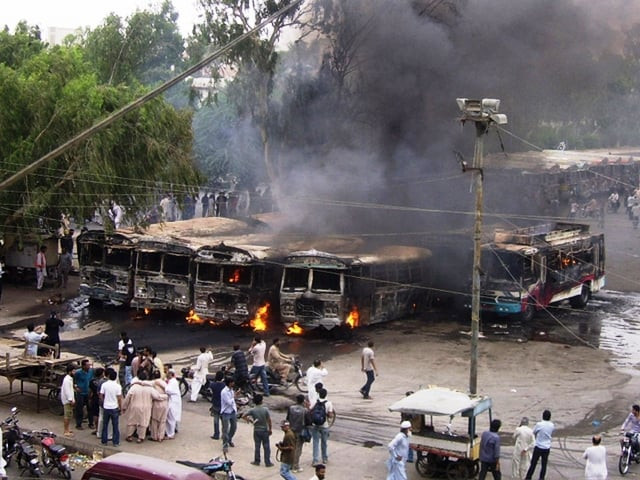Karachi hosts the largest concentration of the urban Pashtun population, surpassing Peshawar, Quetta and Kandahar. It is the largest Pashto-speaking city in the world.
In fact, by some accounts, Pashtuns make up for more than 15 per cent of the total population in Karachi.
Pashtuns contribute significantly to the economy of Karachi through business and labour. The fact that the Awami National Party (ANP) managed to win two seats in the 2008 elections is evidence for large Pashtun existence in the city. ANP, as a party, is changing and is becoming a counter-force to the Muttahida Qaumi Movement (MQM).
Karachi is no longer a one-party city; this fact has to be accepted.
Political space needs to be given to everyone otherwise the example of Fata is in front of us.
Interior Minister Rehman Malik should stop blaming the third element and get to the root cause of the violence that erupts every now and then in Karachi.
The media needs to provide authentic, in-depth analysis for all of us to see the path to a solution; blaming the government in this case just doesn't help Pakistan. The fact is that Karachi has a long history of ethnic violence between the Urdu-speakers and Pashtuns.
This is not to undermine the fact that other destabilising forces such as gang-warfare, weapons dealers and land mafia, but it is mainly the targeted killings of political rivals that eventually turns into such bloodshed, as we witnessed yesterday.
The ANP is a secular party that has been a victim of the Taliban militants and other than the Pakistan Peoples Party (PPP), it speaks against the Taliban more forthrightly than any other political force. Hence, for peace in Karachi, the ANP has to be accepted and worked with as an equal partner.
Pashtun leaders have very often called for acceptance of Pashtun existence in Karachi by the MQM. Yet, the madness of blaming all Pasthuns, rather every Pashtun, of being a terrorist prevails.
Where will this philosophy lead us?
The patriotic orthodoxy prevalent in the majority in Karachi and the majority in Punjab has already alienated the Baloch. Similarly, the Pashtuns in Khyber-Pakhtunkhwa and Balochistan do not think any different for being cornered when we talk about loyalty to our country Pakistan.
The mantra of who is more loyal to Pakistan for their ethnicity or language they speak is absurdly nonsensical but continues unabated and demonstrated. We saw this yet again in the expressions used by demonstrators in Karachi, protesting against Zulfiqar Mirza.
The Pashtuns of Karachi must be brought into the mainstream and their existence must be accepted; otherwise peace in the city will remain a dream.
The events related to the later clash of MQM with PPP post-July 13 demonstrate that fascist tendencies are taking root and even sitting ministers of the majority party of the province can’t use their right of free speech when it comes to criticising the MQM.
Political space, which is about reinforcing the foundations of democracy, after the protests witnessed in Karachi, has become a core problem and is increasingly shrinking in the city.
One party alone cannot do justice to the diversity and complexity of the population of Karachi. This needs to be changed, to transform the power struggle into a true and representational democracy.
Karachi politics: Make space for the Pashtuns
One party alone cannot do justice to the diversity and complexity of the population of Karachi.



COMMENTS
Comments are moderated and generally will be posted if they are on-topic and not abusive.
For more information, please see our Comments FAQ